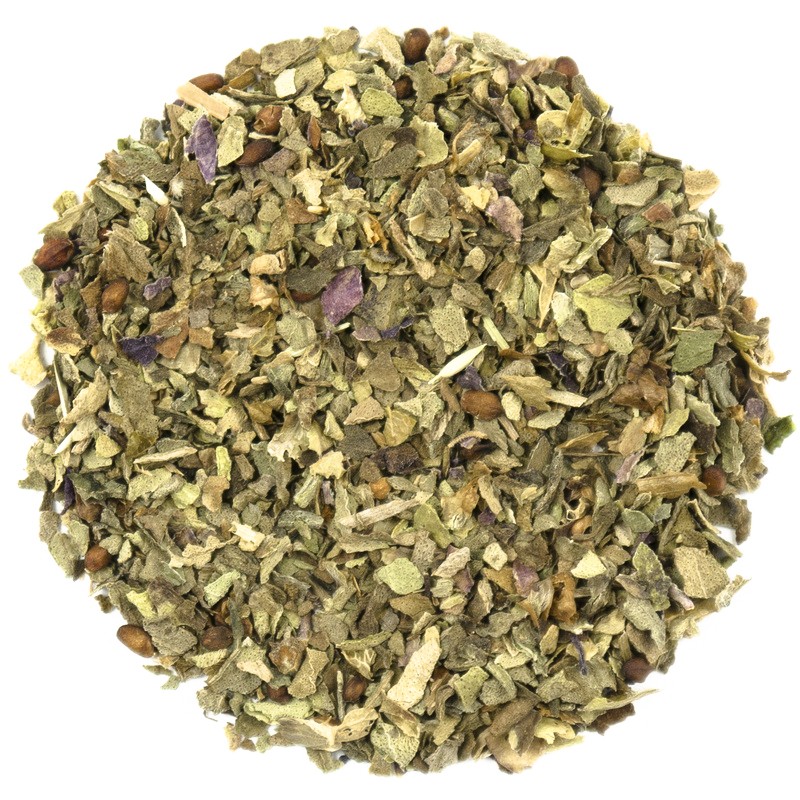Herbal Tea Brewing Guide

1 Teaspoon
Add 1 teaspoon per person and one for the pot.

95⁰c - 100⁰c
Boil using fresh water, at a temperature of 95⁰ - 100⁰c.

8 - 10 Mins
Steep for 8-10 minutes, depending on personal preference.
About Product
-
Product Description
Use your senses and invigorate your spirit with our Tulsi Holy Basil Tea. It’s a cherished herbal tea with cultural and spiritual significance. This history dates back to millennia. People revere this caffeine-free elixir as the earthly form of the god Vishnu. It has a tapestry of sweet herb notes with refreshing mint in every brew.
It comes from the heart of the Indian subcontinent. This tea is a symbol of purity and strength. People use it in daily rituals and traditional medicine. They use it to restore balance and promote longevity.
Tulsi Holy Basil Tea goes beyond taste. It boosts health with many benefits.
What is Tulsi Holy Basil Tea?
Tulsi Holy Basil Tea is a type of basil. Known as Ocimum sanctum, it belongs to the mint family. It is native to the Indian subcontinent. It thrives in warm and tropical climates, growing in rich, loamy soil. Tulsi has a unique attribute. It thrives in dry, not water-logged areas. This makes it well-suited to Indian topography.
At dawn, people harvest the plant. This is when its oils and nutrients are at their peak. This is at the end of the rainy season, when the leaves are full of essence.
This plant has a long history. India steeped it in ancient traditions. People have cultivated it for over 3000 years. Hindus consider the Tulsi plant sacred. Its spiritual meaning is revered. It is a symbol of purity and is a staple in religious ceremonies, as well as Ayurvedic medicine.
The name ‘Tulsi’ means ‘the incomparable one.’ This reflects its high place in Indian culture. People use every part of the Tulsi plant, especially the leaves, to brew a potent and beneficial tea.
People have sipped this Herbal Tea for centuries. They did so for its health benefits and spiritual practice. It offers a deep connection to the region’s heritage and holistic lifestyle.
How to Make Holy Basil Tulsi Tea
Making a cup of Tulsi Holy Basil Tea is simple. But, it’s enriching. It lets you enjoy its full range of flavors and health benefits. Here’s how to make the perfect brew:.
- Prepare the Water: Bring water to a rolling boil. If you are picky about your tea, you might aim for a temperature of about 95°C (200°F). It is under boiling and perfect for herbal teas.
- Add the Holy Basil: For each cup of water, add approximately 1 teaspoon of dried Holy Basil leaves. If you prefer a stronger tea, you can add more leaves to taste.
- Steep the Tea: Place the leaves into the boiling water. Cover the pot or cup and let the tea steep for about 7 to 10 minutes. This allows the essential oils and flavours to infuse.
- Strain the Tea: Once the tea has steeped to your liking, pour it through a fine strainer to remove the leaves. If you used a tea infuser, lift it out of your cup.
- Sweeten If Desired: Tulsi tea has a sweet, herbaceous flavor. But, you can add honey or your preferred sweetener if you want.
- Enjoy: Sip your tea, allowing the warm liquid to soothe and the aroma to calm your senses. Enjoy this ancient recipe for wellness as part of your daily ritual.
- Optional Additions: You can enhance your Tulsi tea with a squeeze of lemon, a slice of ginger, or a dash of cinnamon. It will add extra flavor.
Remember, the key to the perfect cup of Tulsi Holy Basil Tea is the care taken during preparation. It reflects the age-old traditions that make this drink special.
Tasting Notes: Refreshing, Minty, Sweet Herbal
Caffeine Content: Caffeine-Free
Ingredients: 100% Pure Tulsi Holy Basil Leaves
Tulsi Holy Basil Tea Benefits
This infusion is not only a delight to the senses, but also a treasure trove of health benefits. Here’s an overview of the advantages you can enjoy with each sip:
- Stress Relief: People consider it an adaptogen. It may help the body adapt to stress and boost energy.
- Immunity Boosting: Tulsi has immunomodulatory properties. They support the immune system, potentially warding off infections.
- Anti-Inflammatory: With anti-inflammatory compounds, this tea can help relieve inflammation and associated pain.
- Heart Health: Regular consumption may contribute to cardiovascular wellness, including blood pressure regulation.
- Metabolic Regulation: It is thought to help balance blood sugar levels. Supporting your metabolic health.
- Digestive Health: Tulsi tea can help digestive health. It soothes the stomach and reduces discomfort.
- Respiratory Advantages: Tulsi has traditionally been used to support the respiratory system. Aiding in the relief of congestion and other symptoms.
- Antioxidant Properties: It helps combat oxidative stress. It may protect the body from free radicals.
Adding Tulsi Holy Basil Tea to your daily routine can be a step toward holistic well-being. It taps into centuries of Ayurvedic practice. Explore the fresh flavors and health benefits of this sacred tea. Embrace a new level of wellness.
Also, you can try different Tulsi Holy Basil Tea variations. Mix in other herbs or spices, like Peppermint Tea or Cardamom Tea, for more flavor and benefits. Let your taste buds lead you on a journey to discover the wonders of this ancient herbal infusion.
-
Delivery Information
We offer reliable delivery services through Royal Mail to ensure that your orders reach you on time.
Here are the main points you should be aware of:
- Standard UK Delivery: £3.95 excluding delivery charge.
- Delivery Times: Orders are processed and dispatched within 2-5 working days but they may take longer during busy times. It is worth noting that all our orders are packed by hand in order to maintain the quality.
- Free Delivery: We are delighted to provide free shipping for UK orders over £35*. Moreover, customers from Europe can enjoy free shipping for any purchase above €75*. Furthermore, we offer free delivery in the USA for all purchases exceeding $125*. Please note terms and conditions may apply.
- Tracking: When your package is sent you will receive a tracking number via email so as to keep tabs of its progress.
International Shipping
We do ship worldwide meaning our products can be accessed by anyone around the world.
Here are some important details:
- Delivery Times: International deliveries vary based on destination, generally taking between 7-14 working days.
- Shipping Costs: International shipping costs are calculated at checkout based on your location and weight of your order. View full delivery charges for your location.
- Customs and Import Duties: Remember customs or import duties may exist depending on regulations in your country; these charges are borne by the customer.
Returns Policy
Your satisfaction is our top priority, however if for any reasons you’re not completely happy with your purchase, simply follow our returns procedure:
- Eligibility: Items returned within 30 days of receipt must remain unopened and in their original condition.
- Process: In order to return an item contact our customer service department using your unique order number after which detailed instructions will be given concerning returning them back to us securely.
- Refunds: Our aim is to refund you within 5-7 working days upon successful reception of returned goods. The refund amount will be credited to your original payment method.
For any other Enquiries or help please contact our Customer Support Team always at your service.
-
Product Reviews

 Loose Leaf Tea
Loose Leaf Tea Pyramids
Pyramids Tea Bags
Tea Bags Africa
Africa Assam
Assam Ceylon
Ceylon Chinese
Chinese Darjeeling
Darjeeling European
European Indian
Indian Japan
Japan Nepal
Nepal South East Asia
South East Asia Ayurveda Tea
Ayurveda Tea Black Tea
Black Tea Chai Tea
Chai Tea Flowering Tea
Flowering Tea Fruit Tisanes
Fruit Tisanes Green Tea
Green Tea Herbal Tea
Herbal Tea Matcha Tea
Matcha Tea Oolong Tea
Oolong Tea Organic Tea
Organic Tea Pu erh Tea
Pu erh Tea Rooibos Tea
Rooibos Tea White Tea
White Tea Asian Coffee
Asian Coffee Caribbean Coffee
Caribbean Coffee Central American Coffee
Central American Coffee South American Coffee
South American Coffee Coffee Blends
Coffee Blends Decaffeinated Coffee
Decaffeinated Coffee Espresso Coffee
Espresso Coffee Ethically Sourced Coffee
Ethically Sourced Coffee Flavoured Coffee
Flavoured Coffee Organic Coffee
Organic Coffee Single Origin Coffee
Single Origin Coffee Chocolate 1
Chocolate 1 Chocolate 2
Chocolate 2 Chocolate 3
Chocolate 3 Chocolate 4
Chocolate 4 Chocolate 5
Chocolate 5 Chocolate 6
Chocolate 6 Chocolate 7
Chocolate 7 Chocolate 8
Chocolate 8 Chocolate 9
Chocolate 9 Loose Tea Filters
Loose Tea Filters Tea Accessories
Tea Accessories Tea Bricks
Tea Bricks Tea Caddies
Tea Caddies Tea Caddy Spoons
Tea Caddy Spoons Tea Gift Ideas
Tea Gift Ideas Tea Infusers
Tea Infusers Tea Strainers
Tea Strainers



